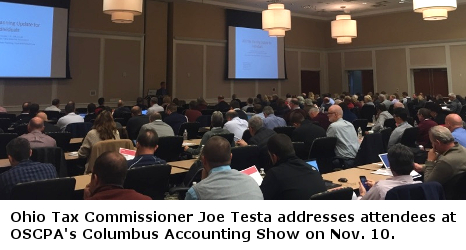Effective June 1st 2018 Zinner & Co. will officially adopt Intuit’s Quickbooks Discontinuation policy. If you are using Quickbooks version 2015 or older, you will need to upgrade to maintain compliance. This policy will maintain support for the three most recent versions of Intuit Quickbooks. The annual drop date for the oldest product version is May 31st. Intuit’s current “Disco” policy states:
Tax Cuts and Jobs Act of 2017: What it means to you and your business
Zinner & Co. Tax Department tax services , Brett W. Neate , Taxes - Corporate & Business , Taxes - Planning, Rules and Returns , Taxes - IndividualCongress is enacting the most sweeping tax legislation in thirty years, one that will make fundamental changes in the way you, your family and your business calculate your federal income tax bill, and the amount of federal tax you will pay. Since most of the changes will go into effect next year, there is still a narrow window of time before year-end to soften or avoid the impact of crackdowns and to best position yourself for the tax breaks that may be heading your way.
Here is a quick rundown of last-minute moves you should think about making.
“Data breach can’t happen in our company, we are not big enough to be a target.”
All in (or out of) the Family: Who will inherit the family business?
DeAnna Alger, CPA business succession , DeAnna AlgerAs a business owner, one often invests much time and energy into the day-to-day operations. As a result, many owners are likely to sidestep or forget to take the time to establish a long-term plan for the business and simply presume their child will hold the same passion for the business and knowledge in the industry as they have. But, what happens if the child or children have no desire to inherit the business?
First, having a succession plan in place for the business is just as important as having a will for ones personal assets. Without a succession plan, the company’s future, assets, and legacy are potentially at risk, regardless of who handles the business when an owner retires.
Take This Job and … Retire? 5 things you must consider before clocking out
Zinner & Co. Taxes - Individual , Retirement Planning & IRAsWhile many entrepreneurs find satisfaction in owning their business and others simply love their jobs, most do not necessarily want to work for the rest of their lives.
If you are such an entrepreneur, you are not alone. Many look forward to the idea of never having to work again, yet, the concern about whether there will be enough income to survive can’t be overlooked. This leads to the all-important question: How much does one need to save for retirement?
Ohio Manufacturer? Sales tax savings that help your business grow
Brett W. Neate, CPA, MTax Ohio business owners , Brett W. Neate , manufacturingLike everything in life, the manufacturing process has a beginning and an end. Understanding that process is important for making business decisions regarding raw materials, staffing, inventory, fixed assets, and innovation.
This knowledge is also used by well-advised businesses to reduce tax expense in Ohio and many other states that have designed their sales tax structure to promote manufacturing.
Read more from Brett Neate here
Ohio does not require sales or use tax to be paid on the purchase or consumption of items used primarily in the manufacturing operation to produce personal property for sale. One of the challenges in maximizing the benefit of this exemption is understanding, for sales tax purposes, when the production process begins and ends.
Production begins when raw materials are committed to the process and ends when the product is in its final state or form. While these definitions seem straightforward, they tend to incredibly nuanced depending on the product being created and the specific process being utilized by the manufacturer.
An additional challenge in properly applying the exemption is when assets or materials are used in both manufacturing and non-manufacturing processes. For example, forklifts are often used to move raw materials, production items, and finished goods. The cost to purchase, maintain, and power the forklifts may or may not be subject to sales tax depending on whether or not they are used primarily in the production process.
Electronic Delivery of Invoices to Begin January, 2018
Zinner & Co. Ohio business owners , Business - Management, Issues & Concerns , Zinner NewsFall 2017 | Winter 2018
Zinner & Co. is ready to ring in the New Year with a commitment to sustainability, focus on our environment, and assurance that our clients receive year-round service. As part of this initiative, beginning in January 2018, business client invoices will be delivered via electronic mail. To ensure timely and effective receipt of your invoice, please take a moment to update your company information by downloading the form here and adding your billing department information if it is different than your primary company contact. (Please let us know if you prefer to continue to receive your invoice via USPS). You can return the form to us at ClientUpdate@zinnerco.com or via US mail:
Split Ends: Why we're reading about 'gray divorce'
Zinner & Co. Tax Department divorce , Retirement Planning & IRAsThe Journal of Accountancy recently published an interesting article addressing the issue of 'gray divorce.' Gray divorce refers to couples divorcing later in life and while a 30-something divorcing couple may be squabbling over custody, visitation, and credit card bills, those couples divorcing over age 50 are facing battles over retirement funds, the long-term residence, and a diverse portfolio of assets.
Oftentimes, divorcing couples believe that because the court suggests a particular division of assets, that it is what they must do. Couples may not realize that the court will decide in the absence of either party striking an agreement. When the court makes a decision for the couple, this may not be in the best interest for either.
Learn more about retirement and estate planning in Gary's blogs
Meeting with your CPA, whether as a couple or individually, will allow you to take a closer look at the reality of the tax and financial implications depending on how the assets are ultimately divided. Also, your CPA will run scenarios, especially if one spouse was the higher earner or if one spouse did not work, which will greatly affect the financial future of both.
The Ohio Department of Taxation is offering amnesty from Jan. 1 to Feb. 15, 2018 to individual and business taxpayers.
ODT has launched a statewide campaign to raise awareness of the amnesty. Ohio Tax Commissioner Joe Testa kicked off the effort Nov. 10 by discussing the issue with attendees at OSCPA’s Columbus Accounting Show.
The Department of Taxation will offer amnesty on the following:
- Individual taxes
- School district income taxes
- Employer withholding taxes
- Employer withholding for school district income taxes
- Pass-through entity taxes sales tax
- Use taxes
- Commercial activity
- Financial institutions
- Cigarette and other tobacco products
- Alcoholic beverage
Amnesty is available only for taxes that were due and payable as of May 1, 2017, and still remain underreported or unreported. Those who fully pay qualifying tax delinquencies will owe no penalties and only half the interest normally charged. The program does not apply to any tax for which a notice of assessment or audit has been issued, for which a bill has been issued, that relates to a still-open tax period, or for which an audit has been conducted or is pending.
Taxpayers can learn more and determine eligibility at www.OhioTaxAmnesty.gov; or by calling 800-304-3211.
This article appears courtesy of the Ohio Society of CPAs Community News published Nov. 16, 2017.
Tis the Season of Saving: 5 things you can do now to help reduce your taxes
Zinner & Co. Taxes - Corporate & Business , Taxes - Individual , income tax , Matt SzydlowskiIn the quest for gifts and seasonal savings together with the promise of continued prosperity, many taxpayers overlook some of the simple year-end moves they can do that will help to reduce their taxes and improve the bottom line. There are many action steps you can perform today in order to save taxes for the next tax period. Below, find a shining display of our top five tips to save future tax dollars.
About Us

Since 1938, Zinner has counseled individuals and businesses from start-up to succession. At Zinner, we strive to ensure we understand your business and recognize threats that could impact your financial situation.
Recent Blog Posts
Categories
- 1031 Exchange (2)
- 401k (2)
- 529 plan (4)
- ABLE Act (1)
- account systems (3)
- accounting (8)
- Affordable Care Act (8)
- alimony (2)
- American Rescue Plan Act (1)
- Ask the Expert (5)
- Audit and Assurance Department (13)
- audits (8)
- Bank Secrecy Act (1)
- banks (1)
- Barbara Theofilos (6)
- Beneficial Ownership Information (1)
- Bitcoin (1)
- block chain (2)
- BOI (3)
- Bookkeeping (1)
- Brett W. Neate (28)
- budgets (1)
- Bureau of Worker's Compensation (12)
- Business - Management, Issues & Concerns (51)
- business income deduction (3)
- business succession (7)
- business travel expense (3)
- business valuation (5)
- capital gains (2)
- careers (7)
- cash flow (2)
- Charitable Donations (2)
- Child Tax Credit (2)
- Chris Valponi (8)
- City of Cleveland (1)
- Cleveland COVID-19 Rapid Response Fund (1)
- Cleveland Rape Crisis Center (2)
- college (3)
- Community (24)
- Compliance (1)
- Coronavirus (24)
- Corporate Transparency Act (1)
- COVID-19 (30)
- Credit card fraud (5)
- credit reporting (2)
- cryptocurrency (2)
- CTA (2)
- cybersecurity (17)
- dead (1)
- DeAnna Alger (6)
- death (2)
- debt (4)
- deductions (14)
- Deferring Tax Payments (4)
- Department of Job and Family Services (2)
- depreciation (2)
- Digital Tax Payment (3)
- divorce (4)
- DOMA (3)
- Economic Impact Payments (2)
- Economic Injury Disaster Loan (4)
- education (8)
- EIDL (1)
- electronic filing (4)
- Electronic Tax Payments (3)
- Emergency Working Capital Program (1)
- employee benefit plan auditor (1)
- Employee Leave (3)
- Employee or Independent Contractor (6)
- Employee Retention Credit (3)
- employment (2)
- ERC (3)
- Eric James (8)
- Estates, Gifts & Trusts (48)
- expenses (5)
- Families First Coronavirus Response Act (2)
- FASB (1)
- FBAR (1)
- FDIC coverage (1)
- Federal Assistance (4)
- filing (3)
- financial planning (8)
- Financial Planning - College (9)
- financing (3)
- Firm news (119)
- first responders (1)
- FMLA (1)
- foreign assets (3)
- fraud (38)
- FSA (1)
- fundraising (9)
- Gabe Adler (1)
- gift tax (5)
- HDHP (2)
- health care (3)
- home (2)
- home office (1)
- Howard Kass (2)
- HRA (1)
- HSA (5)
- identity theft (34)
- income (1)
- income tax (58)
- independent contractor (1)
- Inflation (1)
- Insurance (7)
- internal control (4)
- international (2)
- Intuit (1)
- investments (4)
- IRS (91)
- jobs (5)
- John Husted (1)
- K-1 (1)
- Laura Haines (3)
- Layoff (2)
- Layoffs (1)
- leadership (3)
- lease accounting standards (1)
- life insurance (1)
- LLC (3)
- Loans (2)
- longevity income annuities (1)
- Lorenzo's Dog Training (1)
- Magic of Lights (1)
- management advisory (3)
- manufacturing (2)
- Matt Szydlowski (3)
- medical (7)
- Medicare (2)
- mergers and acquisitions (1)
- Mike DeWine (2)
- Millennial Concepts (2)
- minimum wage (1)
- NAIOP (1)
- National Defense Act (1)
- non-profit reporting (10)
- non-profits (38)
- not-for-profit (26)
- OATC (1)
- OBBB (3)
- ODJFS (1)
- office (1)
- ohio (13)
- Ohio Accounting Talent Coalition (1)
- Ohio business owners (18)
- Ohio Department of Jobs and Family Services (4)
- Ohio Department of Taxation (7)
- Ohio Incumbent Workforce Training Voucher Program (1)
- Ohio Society of Certified Public Accountants (1)
- One Big Beautiful Bill (10)
- Online Tax Payment (4)
- Operations (2)
- OPERS (1)
- OSCPA (1)
- Overtime (2)
- owners of foreign entities (1)
- partnerships (5)
- passwords (1)
- Paycheck Protection Program (9)
- payroll (8)
- penalties (3)
- pension (2)
- personal finance (2)
- planning (4)
- ppp (7)
- Productivity (5)
- Qualified Business Income (1)
- quickbooks (10)
- real estate (14)
- record retention (2)
- records (2)
- Reporting (1)
- Republican National Convention (1)
- Retirement Planning & IRAs (54)
- Richard Huszai, CPA (5)
- RITA (1)
- Robin Baum (6)
- RRF (1)
- S Corporation (1)
- SALT (8)
- SBA (8)
- scams (14)
- SECURE 2.0 Act (1)
- security (6)
- SharedWorks (1)
- Shutdown (3)
- Silver Linings (9)
- simplified employee pension (1)
- Small Business (5)
- SMB (12)
- Social Media (1)
- social security (4)
- Speaker Series (2)
- spouse (1)
- start ups (8)
- Stay at Home Order (3)
- Steven Mnuchin (1)
- Sue Krantz (6)
- SVOG (1)
- tangible property (1)
- tax (27)
- tax avoidance (12)
- Tax Credit (7)
- Tax Cuts and Jobs Act of 2017 (31)
- Tax Exempt (1)
- Tax Holiday (1)
- Tax Interns (2)
- tax services (28)
- taxes (45)
- Taxes - Corporate & Business (107)
- Taxes - Individual (125)
- Taxes - Planning, Rules and Returns (198)
- TechCred (1)
- technology (8)
- The CARES Act (6)
- The SOURCE (1)
- tiag (3)
- transaction advisory (2)
- Treasury Department (5)
- Trump Account (1)
- tuition (3)
- U.S. Department of the Treasury (1)
- U.S. Small Business Administration (6)
- Unclaimed Funds (1)
- Unemployment Benefits (4)
- Unemployment Insurance (1)
- withdrawls (2)
- withholding (6)
- Workers Comp Billing Changes (1)
- Zinner & Co. (35)
- Zinner News (32)












